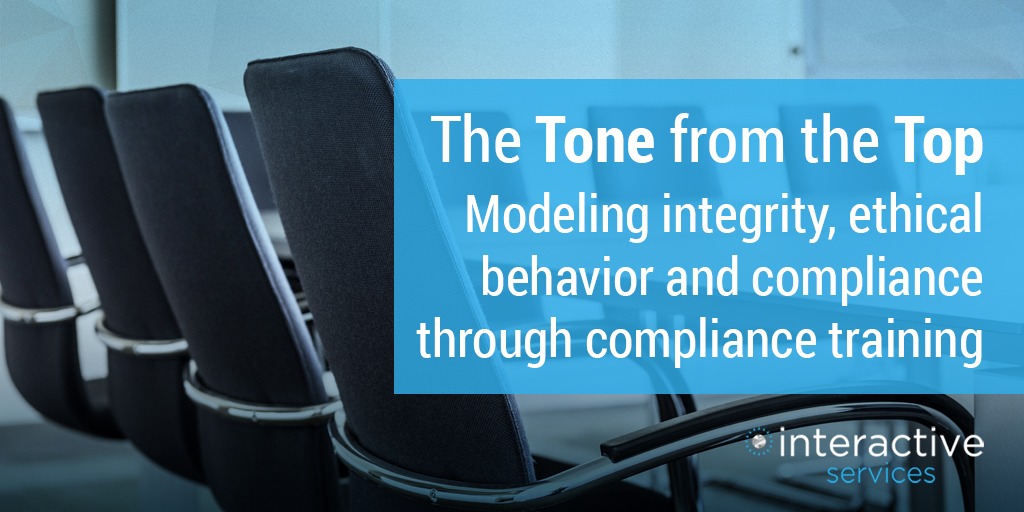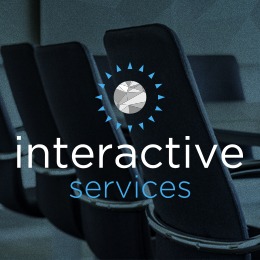
Most businesses consider a strong commitment to performing with integrity a “must have.” However, some struggle to put it into practice when compliance is left purely to the compliance professionals. A company-wide culture of integrity, not just on a corporate level, but also on a social and environmental level, begins with the board and the CEO, and cascades down through an organization to its most junior employees. What is the glue that connects all these people?
Compliance training: the annual reminder that we all live by the same rules, and are part of (and responsible for upholding) the same compliance culture.
What better vehicle than compliance training to show (through videos, podcasts, messages) that everyone from the CEO down is engaged in the protection and elevation of the organization through ethical and compliant practice. The senior management team can also appear in training modules, showing how different levels within the organization might model the tone set by the CEO. And finally, individual contributors can feature in training modules—showing how compliance and business integrity can and should be part of every internal and external interaction.
What can different levels within the organization contribute to your compliance training?
- The Board / CEO
Messages from the Chairman or CEO are a powerful way to tell the organization that ethics and compliance are important to the business. Use video, audio and images to make the messages real, personal and impactful. Include these messages early in your compliance training modules to show learners that they should pay attention to what is coming next.
- Senior Management
Your senior management team are engaged in the operational day-to-day of the organization. They see the compliance near misses and opportunities, and they can share war stories. Use video to capture their tales of compliance triumph and disaster so that the whole organization can learn from their successes and mistakes. Let them make it clear throughout the compliance training modules that speaking up is encouraged, and no one should fear retaliation for raising a concern.
- Compliance Professionals
Your compliance professionals, from the Chief Compliance Officer down, live, eat and breath compliance. Who better to relay the key video messages in your compliance training modules that will keep you, the organization and the brand safe from compliance breaches?
- Managers & Individual Contributors
Your compliance training should reflect its biggest audience: your managers and individual contributors who are the front line in the war against compliance breaches. They can share valuable experiences and examples that others might learn by.
When employees understand the emphasis placed on ethical and compliant behavior by the company, and they understand what support resources are available to them, the cultural tone of the company changes—suddenly, everyone works in compliance!
However, as with any cultural endeavor, this is not a ‘one-and-done’. Here are a few ideas for strengthening and maintaining your culture of integrity and compliance through training:
- Annual review by every associate of all relevant ethics policies and codes of conduct via online training modules that link to relevant policies
- Induction training on compliance standards for new employees within their first month
- Annual attestation (built into online compliance training modules) allowing every associate to:
- Show they understand the consequences of not adhering to compliance policies
- Affirm their commitment to report any ethical violations
- Regular reiteration through compliance training modules to associates that they can speak up without fear of retaliation (Note that any associate who chooses to report a violation is actually protected by the Whistleblower Protection Act which was passed in 1989.)
- Annual company-wide ethical culture survey. These have become a common practice among many public and private companies and can be delivered at the end of formal compliance training modules. They provide a snapshot of how effective the CEO and top tier management has been in setting the right cultural tone.
As a business, it is crucial that employees and consumers understand the level of commitment that the board and CEO has for maintaining a culture of integrity. It should be ingrained in the mission statement, in the company goals, and, of course, in all compliance training materials. Employees should be fully trained in the ethical policies of the company, and they should see those policies being reflected by the board itself, the CEO, and at all levels of management. When that happens, integrity becomes a core feature of your organization.
Click here to learn about our innovative integrity training programs.



